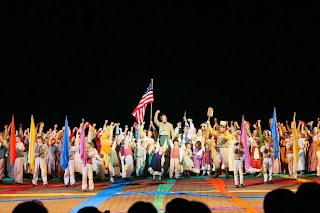 |
| This isn't from Wicked. It only looks like the lollipop guild. |
Wicked
I have never really had the opportunity to attend very many musicals. They're usually pretty pricey, and it's just so much easier to stay home and rent a movie. However, I took theater appreciation in collage, so I got to discover the wonderful world of musicals for the first time. One of the requirements to pass the class was to see two theater productions, so my mother and I made the cautious journey to the nearby theater to experience two plays. One of those was Wicked.
I've never had so much fun in my life. I came out of that theater beaming so hard, I couldn't stop. I felt like I wanted to take all of the money I had and shove it into the Wicked charity fund (I didn't, but I did give them five dollars). It entertained me, but it also uplifted me. I wanted to follow Elphaba's example and rise above my circumstances no matter what people thought of me. As I thought about what work best for Volume 2 of Commandments in the Media, Wicked stood out to me as an excellent candidate.
The Commandments in Wicked
A lot of times we're aware of how breaking the commandments causes problems in our lives, but we don't really think about how our actions can affect others. That seems to be the background theme of Wicked. Elphaba, the future wicked witch of the west, is a good natured woman who only wants to use her unique talents to help others. However, her life is thrown into chaos because of the selfish acts of one little man, The "Wonderful" Wizard of Oz.
In the very beginning of the play, The Wizard of Oz and Elphaba's mother have a secret affair. This moment affects Elphaba for the rest of her life. What should have been a loving family relationship is tainted by embarrassment, because of the affair and because Elphaba was born into the world green. When Elphaba and The Wizard finally do meet, The Wizard wastes no time trying to take advantage of her. When Elphaba refuses him, he throws her under the bus, ensuring that she would be labeled as 'Wicked' for the rest of her life. The Wizard's false witness clings to her until the day she "melts."
I don't want to make Wicked sound like a depressing musical, because it really isn't. I just want to point out that beyond the inspiring music and Elphaba's cheery attitude, Wicked depicts the harsh reality that we can't break commandments without affecting people around us.
On the postive side, Wicked also demonstrates the power a little service and hope have. Despite her circumstances, Elphaba remains stalwart and good until the very end. Her example changes Glenda's heart, which makes her the hero we see in the Wizard of Oz. Her efforts to help the Cowardly Lion, Tin Man, and Scarecrow backfire intially, but as we can later see, the weaknesses they received eventually became strengths. The only person Elphaba doesn't use her talents for is herself. I think the message here is powerful; no matter who you are, your service will change lives. After all, isn't that what Christ did?
In the very beginning of the play, The Wizard of Oz and Elphaba's mother have a secret affair. This moment affects Elphaba for the rest of her life. What should have been a loving family relationship is tainted by embarrassment, because of the affair and because Elphaba was born into the world green. When Elphaba and The Wizard finally do meet, The Wizard wastes no time trying to take advantage of her. When Elphaba refuses him, he throws her under the bus, ensuring that she would be labeled as 'Wicked' for the rest of her life. The Wizard's false witness clings to her until the day she "melts."
I don't want to make Wicked sound like a depressing musical, because it really isn't. I just want to point out that beyond the inspiring music and Elphaba's cheery attitude, Wicked depicts the harsh reality that we can't break commandments without affecting people around us.
On the postive side, Wicked also demonstrates the power a little service and hope have. Despite her circumstances, Elphaba remains stalwart and good until the very end. Her example changes Glenda's heart, which makes her the hero we see in the Wizard of Oz. Her efforts to help the Cowardly Lion, Tin Man, and Scarecrow backfire intially, but as we can later see, the weaknesses they received eventually became strengths. The only person Elphaba doesn't use her talents for is herself. I think the message here is powerful; no matter who you are, your service will change lives. After all, isn't that what Christ did?









